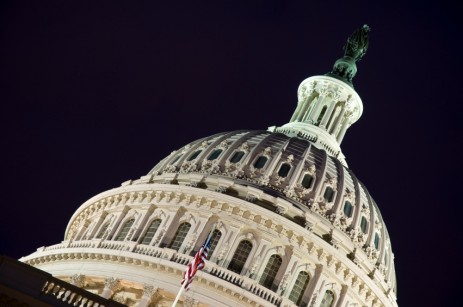This is the final installment of a three-part response to Theda Skocpol’s report on the failure to pass a climate bill. Here’s part one and part two.
When pondering the failure of a big legislative initiative like cap-and-trade — and oh, there’s been so much pondering! — there are two basic perspectives one can take.
First, you can think about how a campaign could be improved so that next time the initiative can clear the bar. That’s mostly what my recent post-cap-and-trade piece (and the Theda Skocpol report [PDF] it discussed) focused on. Build a bigger movement, make the legislation simpler, get more help from the president, whatever. That kind of stuff.
Alternatively, you can focus on how to lower the bar — how to make it easier to pass big, important legislation in general.
That kind of focus has been rare among climate hawks. Activists and analysts are too inclined to simply accept the political landscape as it stands. But the fact is, it has become absurdly, anti-democratically difficult to get anything big done in U.S. politics. Or to put it more bluntly: U.S. politics is broken.
Why did cap-and-trade fail? Because of filibuster abuse. That’s the simplest and most directly causal answer. Enviros had business and public opinion on their side. They had majorities in both houses of Congress on their side. That’s a lot! And it ought to be enough. But the bill failed because, unlike every other democratic institution in the damn world, including state legislatures, juries, and the judge’s panel on American Idol, the U.S. Senate now requires a supermajority. And that’s in an institution that is already corrupt, in which rural and fossil interests are already overrepresented, in which money is ubiquitous. It’s just an impossible bar to clear.
It has taken a long, long time for power brokers in the green world to understand the importance of these kinds of procedural issues. Along those lines, let me highly recommend this post from Matt Lewis, who was director of communications at ClimateWorks during the cap-and-trade battle. He tried to suggest to some green philanthropists that winning public opinion was not enough, since public opinion is no longer particularly connected to legislative outcomes. He was laughed at.
But as he notes, the Senate is unrepresentative, the filibuster is abused, gerrymandering has made House seats both safe and ideologically extreme, and money flows almost unchecked through the political system.
An acknowledgment of these hurdles faced by the climate community would have been appropriate; better would have been if the movement itself, its funders, and the media establishment had properly diagnosed these ills when they first started to metastasize during the Clinton years.
Yup.
However, as he notes, it appears that funders and NGOs are finally getting the clue. Just last week came news of a new coalition of green and progressive groups devoted to “getting big money out of politics, expanding the voting rolls while fighting voter ID laws, and rewriting Senate rules to curb the use of the filibuster to block legislation.”
In other words, they are focused on lowering the bar, making the country more democratic, reconnecting public opinion with legislative outcomes. Perhaps, in the end, this effort will be just as futile and disappointing as the cap-and-trade fight. But for now, I think it’s more promising than anything else on the progressive agenda.
For more on Theda Skocpol’s report on the failure of cap-and-trade, read a summary by Philip Bump and responses from Bill McKibben, Eric Pooley, Joe Romm, Mark Hertsgaard, and Mike Tidwell, plus a followup post from Skocpol herself.



